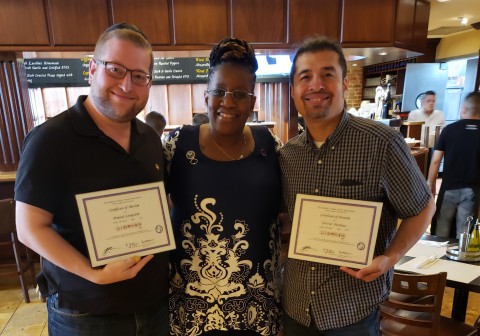
Survivor: Ronda Hicks
Date of Event:
Location of Event: Brooklyn, New York
Rescuer(s):Nancy Coll
Nigel Joseph
It was April 19, 2017. I am a Senior Parole Officer with New York State. It was a report day in which the formerly incarcerated come to report to their officer.
It was my first report day, back at work since my total knee replacement. My officers said that I mentioned in the morning briefing that I didn't feel well. Most assumed it was my knee. I do not remember not feeling well.
Other supervisors noted that my work area appear very unorganized and unkempt (not my usual). We had seven custodies and they stated I was running around like an Energizer Bunny. I do remember it was about 3 pm and I had not eaten. I went to the 3rd floor to see if my supervisors had eaten. For whatever reason, I took the elevator. (I would normally take the stairs to help with knee flexion.)
I exited the elevator and entered the 3rd floor training area. Officer Nancy Coll said that I put my hand up and fell backwards, onto the floor. I'm 5' 10", so it was a long fall. At first they thought I fainted. Officer Coll began CPR. Another officer called 911.
Since it was a relatively new building, the fire department had trouble finding Officer Coll. My Regional Director, who is now my Assistant Commissioner, was instrumental in maintaining order, directing people, and providing direct access for the fire department.
Let it be noted: I was only feet away from an AED machine, and nobody went for it. Why? At that time, we weren't trained.
The fire department couldn't restart my heart with their AED. The EMTs (my heroes) arrived and took over. When I left the building, I still had no heartbeat. They told me that just as they pulled into the trauma ER at Brooklyn Methodist, now N.Y. Presbyterian, they were able to restart my heart.
I was in a medically induced coma for five days, I had an anoxic brain injury, and the outlook wasn't good. They lowered my body temperature to protect my organs. On day four, I was told I was trying to come to and trying to remove the tubes, so they put mittens on my hands and strapped me to the bed.
Eventually, I was awake, but not quite alert. The EMTs checked on me--they were surprised I had survived.
My husband had agreed to SICD therapy and eight days after my SCA, I was implanted and released.
A little more than a year later, I was able to thank my EMTs in person, and I presented them with the pin and certificate from the SCA website.
It's been 4 1/2 years now, and the road has been rough. PTSD was real. My emotions were all over the place. I was fearful and angry.
I took part in the Columbia University AMBET study, mentioned in your newsletter, and received therapy. I was able to resolve most of my issues enough so that I no longer suffer from PTSD.
I am thankful to be alive. I still have a foggy memory, and when my device needed replacement, I became unnerved. But I used mindfulness techniques and all went well.
I take nothing for granted and am attempting to take better care of myself. The SCA is something that happened to me, but it doesn't define me.
Nominated by Ronda Hicks
